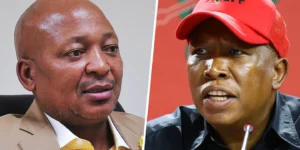By: Clyde N.S Ramalaine
I read with interest how David Monyae, director of the Centre for Africa-China Studies at the University of Johannesburg, in an opinion piece published in the Sunday Times entitled “Africa should beware Donald Trump’s terrifying second coming.” laments the threat that a Trump return to the White House presents for essentially Africa.
In this rejoinder, it is imperative at the outset to clarify that I am not remotely aligned with any Trump’s support in any shape size or form. I solely attempt to critically examine David Monyae’s op-ed, which warns of the potential threats Africa may face with the return of Donald Trump to the White House. In the spirit of a co-authored piece entitled “The Daily Maverick – ‘Africa must seek to emulate the best of China’s successes, not the worst of its excesses’” and others where he cautions Africa against excessive reliance on China, this article focuses on the relationship between the USA and Africa with Trump’s potential return as the central theme.
My response addresses various aspects of Monyae’s arguments, challenging the characterization of Trump’s policies, particularly in relation to Africa, as distinct from that of Biden and questioning the validity of certain claims made in the original piece. I am compelled to also scrutinize Monyae’s perspective on Trump’s impact on international relations, emphasizing the need for a more nuanced understanding of global politics, and suggests that Monyae’s assertions may not fully consider the complexities of the issues at hand. In this regard I use the notion of a common or united Africa as my departure point debunking this one Africa notion that so often is sold by academics and commentators.
Monyae starts by conceding that Trump is likely to become the Republican Party candidate for the November 2024 presidential elections. He does so by highlighting the decisive victories Trump secured in the first two Republican primaries in Iowa and New Hampshire. He further acknowledges that Trump is leading by a slender margin in the majority of national polls. What is the liberal global agenda that Monyae contends Trump is a threat to and that could take the world back to the dark ages of chauvinist nationalism and populism that precipitated the two most devastating wars in history in 1914 and 1939?
We are to surmise that when Monaye refers to a liberal global agenda it is to assimilate a general in reference to a set of political and economic perspectives that emphasize international cooperation, diplomacy, and the promotion of liberal values on a global scale. Liberalism, in this context, is a political ideology that values individual rights, democracy, free markets, and the rule of law. Key components of a liberal global agenda construct may include International Cooperation, Diplomacy and Multilateralism, Human Rights, Free Trade Environmental Sustainability and Global Governance. It’s important to note that the term “liberal” can have different meanings in different contexts, and there may be variations in how individuals or political groups interpret and implement a liberal global agenda. Additionally, political ideologies and agendas are subject to change over time and can vary among individuals and regions.
Critics of the liberal global agenda argue that its emphasis on international cooperation and open markets may lead to unintended consequences. They contend that the promotion of free trade and globalization, while aiming for economic growth, can also exacerbate inequalities both within and between nations. Critics often point to instances where multinational corporations exploit lax regulations in pursuit of profit, leading to social and environmental injustices. Additionally, concerns are raised about the potential erosion of national sovereignty and cultural identity as a result of increased global integration. Skeptics argue that the emphasis on human rights and democracy can sometimes be selectively applied, with powerful nations often pursuing their interests at the expense of less powerful ones. Overall, critics assert that a liberal global agenda may need to be more nuanced and attentive to the complexities and disparities that arise in the pursuit of its goals.
Monyae then makes a startling claim of how ‘many countries in the world are bracing themselves for Trump’s second reign at the White House.’ What would his [Trump’s] presidency mean for Africa? Monyae then, in order to expound on how Trump threatens, pretends a unique ideological positioning as self-evident in Trump’s America’s first mantra.
Primarily, within the discourse as articulated by scholars and commentators akin to Monyae, there exists a prevalent yet fallacious notion of a homogeneous Africa. This conceptualization assumes a unified stance among African nations, envisioning them harmoniously aligned in their responses to critical issues. A critical examination of the voting behaviours across the 54 African nations within the African Union (AU) reveals the inadequacy of this oversimplified perspective. An introductory student in the field of Africa Relations would readily refute the unsubstantiated portrayal of a singular African identity. Thus, it is imperative to contest Monyae’s central argument advocating for a singular African perspective, as discerned through the diverse voting patterns evident in various legislative contexts within the AU and the United Nations (UN). The endeavour to homogenize Africa for the sake of expediency in criticizing Trump is not only disingenuous but also undermines the intricate diversity inherent in the continent’s geopolitical landscape.
Monyae conspicuously avoids addressing a fundamental aspect: within the historical trajectory of the United States and its foreign relations, the prioritization of national interests, encapsulated by the “America First” doctrine, has been a consistent theme, irrespective of the occupants in the White House. Characterizing the perceived threat posed by Trump solely within the framework of “America First” reflects a superficial and inadequately nuanced analysis. The assertion that Trump’s policies deviate significantly from established foreign policy principles requires clarification from Monyae, an authority in foreign affairs. A thorough examination is warranted to identify instances when the United States diverged from prioritizing its national interests in the conduct of its foreign relations, both historically and within the contemporary global context. Such an inquiry is pivotal for a comprehensive understanding of the intricate dynamics at play in the nation’s international engagements.
Monyae further reinforces his assertion of the threat posed by Trump to Africa by highlighting the ‘America First’ paradigm. This approach entails disentangling or withdrawing from trade agreements and multilateral arrangements perceived to compromise U.S. interests. Moreover, Monyae underscores Trump’s imposition of travel bans on entire populations under the guise of anti-terrorism and advocates for the construction of a substantial barrier along the Southern border to curb illegal immigration, ostensibly to preserve America’s cultural integrity. Within Trump’s conceptualization, the global provision of public goods is notably absent, as his worldview prioritizes national interest to the point of supremacy.
Upon initial scrutiny of Monyae’s explications, I momentarily pondered his perceived detachment from American and U.S. political intricacies, particularly within the context of international relations praxis. The challenge lay in comprehending the direct relevance of these nuances to Africa. The fortification of the Southern border, for instance, holds no correlation to Africans attempting illicit entry into the United States. The imposition of travel bans affecting entire populations, while ostensibly laden with emotional undertones, necessitates a critical examination in light of Trump’s first term. This prompts the imperative inquiry into identifying any nation that experienced discernible disadvantages during this period, thereby inviting a call for empirical evidence of a scientific nature from the esteemed scholar.
The concept of American cultural purity, as advanced by Monyae, appears somewhat overstretched, primarily due to his omission in elucidating the nuances of the term ‘culture.’ Culture, being a multifaceted and interdisciplinary domain, assumes diverse meanings contingent upon the academic discipline or field under consideration. It constitutes a complex amalgamation of various elements that cannot be summarily encapsulated within a list of thematic components designed to bolster one’s argument. The notion of an American culture characterized by purity presents an inherent paradox, as the contemporary socio-historical landscape of the United States attests to a mosaic of cultures and ethnicities. In effect, this challenges and refutes the conceptual framework that Monyae propounds.
We had to wait for the more substantive subject matters and themes evident in a withdrawal from the Paris Climate Agreement, The Trans Pacific Partnership, the UN Human Rights Council, and the Iran nuclear threats to defund the UN, railings against NATO, the World Health Organization plus the temerity to describe African countries as shitholes to appreciate the central argument for Monyae’s portrayal and claim of a Trump world imagination which translates to a definite threat.
- The Paris Climate Agreement, established in 2015, is an international accord aiming to mitigate global climate change by limiting global warming to well below 2 degrees Celsius above pre-industrial levels. Trump’s primary critique of the Paris Climate Agreement was centred on economic concerns. He argued that the accord placed undue financial burdens on the United States, claiming it disadvantaged American businesses and workers by imposing stricter environmental regulations and commitments compared to other major economies.
- The Trans-Pacific Partnership was a trade agreement involving twelve Pacific Rim nations, with the goal of promoting economic integration and reducing trade barriers among member countries; however, the U.S. withdrew from the pact in 2017 under President Trump. Trump’s primary gripe with TPP was centered on concerns about its impact on American industries and jobs. He believed it disadvantaged the U.S. by allowing unrestricted trade and posed a threat to domestic manufacturing.
- The Iran nuclear threats refer to concerns about Iran’s nuclear program, particularly its potential to develop nuclear weapons. International efforts, including the Joint Comprehensive Plan of Action (JCPOA), aimed to curb Iran’s nuclear ambitions. Trump’s main concern with the Iran Nuclear Deal (JCPOA) was its perceived inadequacy in addressing Iran’s broader regional activities and ballistic missile program. He advocated for a more comprehensive agreement with stricter terms and conditions.
- The UN Human Rights Council is a United Nations body responsible for promoting and protecting human rights globally. It addresses human rights violations, conducts periodic reviews of member states, and develops initiatives to enhance human rights worldwide. Trump threatened to defund the UN Human Rights Council due to perceived bias against Israel and a failure to address human rights issues in countries with poor records, reflecting his broader skepticism towards international organizations.
Furthermore, it is a matter of record that Trump’s threat to defund the UN Human Rights Council due to perceived bias against Israel is not fundamentally different from the general stance of both Democratic and Republican U.S. presidents. Across administrations, there is a consistent commitment to safeguarding Israel’s interests and challenging what is perceived as biased treatment within international bodies. Trump’s threat to defund the UN Human Rights Council echoes a longstanding bipartisan tradition where U.S. presidents, whether Democrat or Republican, prioritize and defend Israel’s interests in international forums.
- It is a matter of record that Trump criticized concerning NATO (North Atlantic Treaty Organization). for what he perceived as inadequate financial contributions from member countries, urging them to meet their defence spending commitments to ensure collective security.
Allow me to posit that the use of expletives, exemplified by Trump’s derogatory ‘shithole’ assertion directed at Africa, arguably poses the only significant threat to the continent. It appears that numerous African scholars and commentators continue to grapple with the aftermath of such demeaning language. In my perspective, this behaviour aligns with expectations for Trump, characterized by a limited linguistic capacity and a proclivity for resorting to expletives. Furthermore, Trump is emblematic of America, and his articulations resonate with the sentiments prevalent in the nation. I have long acknowledged the reality of U.S. foreign relations, recognizing that the affiliations of blue and red representatives in the White House have minimal impact compared to the overarching and indisputable principle of America First. This fundamental perspective, often attributed solely to Trump by Monyae and others, is an inherent and enduring aspect of U.S. foreign policy.
Monyae asserts that the continuation of the African Growth and Opportunity Act (AGOA) and the President’s Emergency Plan for AIDS Relief (PEPFAR) – identified as the two principal US-Africa initiatives – into Biden’s term is attributed to the checks and balances inherent in the US political system. The viability of these programs in Trump’s potential return is questioned by Monyae, who attributes their survival to an unexplained notion of checks and balances. However, he seems unwilling to accept that their persistence results from Trump’s endorsement, contrary to Monyae’s anticipated opposition. This portrayal of a threat lacks sincerity and lacks the necessary balance in its representation.
Monyae asserts that the Prosper Africa initiative, championed by Trump’s administration to enhance trade ties with Africa, was framed as a response to China’s influence on the continent, suggesting Trump viewed Africa as a pawn in global power competition. Towards the end, Monyae defends China, stating Trump’s protectionist doctrine, particularly against China, would disrupt global growth and harm Africa’s economy. As I read Monyae’s article, I’m inclined to question whether the scholar can discern between international trade diplomacy, his involvement in Africa–China relations, and an inadvertent advocacy for China.
This complexity in alignment becomes evident in academic spaces, where scholars may navigate factional challenges. It raises the question: why isn’t a similar argument posed regarding China’s interests in Africa? The implicit attempt to portray China as a victim, while other trading nations are seemingly exonerated from moral scrutiny, appears biased. It’s crucial to consider that China might pose a more significant threat to Africa, given its extensive history and experience with exploitation by the USA and Europe. Monyae could benefit from a more objective stance on China, questioning why Trump’s engagement with China, despite skewed trade relations, is problematic, and why he overlooks China’s protectionist practices. This invites an examination of whether China is genuinely innocent or the presumed hero in Africa’s economic success.
Monyae introduces what he perceives as the most concerning aspect of Trump potentially returning to the White House – a purported lack of change in his thinking, evident from his campaign rhetoric, and an implied ability to circumvent obstacles encountered during his presidency. This raises questions about the effectiveness of the political system’s checks and balances, a concept left unexplored by Monyae. Additionally, one wonders why there was an expectation that Trump would alter his thinking, given that on election night, Trump won 306 electors and Hillary Clinton 232. In the end because of what some define as seven faithless electors (five Democratic and two Republican), Trump received 304 votes and Clinton 227. Donald Trump became the 45th President of the United States after winning the 2016 presidential election. In terms of the popular vote, Trump received approximately 46.1% of the total votes cast, while his opponent Hillary Clinton received about 48.2%. It’s crucial to recognize that the U.S. uses an electoral college system, where the candidate who wins the majority of electoral votes, not the popular vote, becomes the president.
Monyae’s apparent disconnection of Trump from the electorate, portraying him as an extraterrestrial force, is problematic for discourse, as it falsely depicts Trump as detached from the very American electoral system that propelled him into the White House. Contrary to the notion of Trump being an alien disruptor, it is essential to remind Monyae that Trump’s election and potential return are intrinsically tied to the democratic process that has defined American governance though in evolutionary sense since 1779.
In his concluding remarks on Trump, Monyae briefly shifts focus to imminent threats in U.S. domestic affairs, particularly concerning the reinstitution of the Schedule F executive order. This order, as Monyae outlines, potentially undermines the employment protection of thousands of American civil service employees, granting the president the ease of their dismissal. It is pertinent to reiterate, echoing the sentiment of former Speaker of the U.S. House Tip O’Neill, that all politics is fundamentally local. If Trump assumes power in this scenario, it would reflect the democratic will of millions of Americans who, in good conscience, expressed their discontent with the Democratic leadership under Biden. The scholar should acknowledge this core democratic principle. Monyae concludes by unequivocally stating that an unrestrained Trump would spell adversity for Africa and the global community, citing concerns over his climate denialism exacerbating the impact of global climate change, presenting challenges such as flooding, heatwaves, and droughts, particularly impactful on Africa, which is ill-prepared to defend against these consequences.
In conclusion, this analysis underscores the intriguing assertion that Donald Trump, despite myriad criticisms and controversies, stands out as arguably the first president in recent memory to avoid the label of a “war president.” The juxtaposition with the unfolding realities of Joe Biden’s engagements, particularly in the Russia-Ukraine and Israel-Palestine/Iran contexts, sheds light on a contrasting narrative. The present circumstances suggest that Biden and the Democrats may be susceptible to actions that have the potential to ignite and activate scenarios akin to Armageddon. This stark comparison prompts a nuanced reflection on the complex dynamics of U.S. foreign policy under different administrations.
Monyae’s piece may be considered alarmist due to its tendency to exaggerate the potential threats of Trump’s return, overlooking historical precedents and presenting speculative scenarios that may not align with concrete evidence. The narrative appears to emphasize sensationalism over a nuanced analysis of the complex dynamics involved.
Ultimately, it is challenging to substantiate Monyae’s assertion of an imminent threat posed by a potential second term for Trump, whether on international or domestic fronts, particularly with Africa as a purported target for punitive actions or increased adversity distinct from the current situation under Biden’s administration. Rather than a genuine concern for Africa, I am inclined to question whether the underlying motive behind the opinion piece is primarily rooted in advancing the interests of China, despite being penned by an African scholar.








